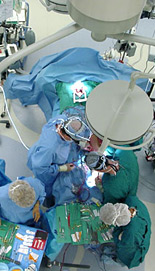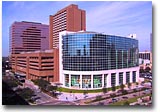History
The CV Surgery Fellowship program at the Texas Heart Institute was developed in the late 1960s when cardiovascular surgery was first emerging as a surgical specialty. From both perspectives of diagnostic studies and of treatment, growth was explosive.
 Founded in 1962 by Dr. Denton A. Cooley, the Texas Heart Institute was at the forefront of cardiovascular surgery. Dr. Cooley’s goal was to create an institute for research and education dedicated specifically to the study of diseases of the heart and blood vessels. He and his team of surgeons provided clinical care for adults and children at the Institute’s collaborating institutions, St. Luke’s Episcopal and Texas Children’s Hospitals. The three institutions shared numerous facilities including operating rooms, recovery intensive care units, outpatient clinic, emergency department, radiology, laboratories and pharmacy services.
Founded in 1962 by Dr. Denton A. Cooley, the Texas Heart Institute was at the forefront of cardiovascular surgery. Dr. Cooley’s goal was to create an institute for research and education dedicated specifically to the study of diseases of the heart and blood vessels. He and his team of surgeons provided clinical care for adults and children at the Institute’s collaborating institutions, St. Luke’s Episcopal and Texas Children’s Hospitals. The three institutions shared numerous facilities including operating rooms, recovery intensive care units, outpatient clinic, emergency department, radiology, laboratories and pharmacy services.
As Surgeon-in-Chief, Dr. Cooley and his associates devised a formal curriculum offering extensive exposure to the gamut of surgical techniques for treating congenital and acquired disease. The curriculum was granted full accreditation in 1972 by the American Council for Graduate Medical Education, appropriating two accredited Residency positions in Thoracic Surgery per year, later increased to three per year. As interest grew, the result was great demand from surgeons worldwide for opportunities to train at the Texas Heart Institute. The Cardiovascular Surgery Fellowship Program that evolved was a natural extension of the residency program. Despite the absence of board eligibility, (which remains reserved for those completing the Thoracic Surgery Residency program), in the ensuring 40+ years of its history, the fellowship has afforded more than 1000 surgeons quality postgraduate training in a strong academic environment. Under careful supervision, they have received hands-on opportunities to hone their operative techniques and patient management skills from established leaders in the field.
Educational Objectives
Educational objectives for fellows are clearly outlined, and privileges are granted commensurate with demonstrated ability and reliability. Fellows do not operate independently nor hold medical staff privileges, but rather are assigned to one of several staff surgeons’ services at St. Luke’s Hospital. Candidates for the fellowship must have completed at least three years of a general surgery residency in order to be considered for this service.
Curriculum
The curriculum of the CV Surgery Fellowship is structured around
- Clinical care including preoperative evaluation and diagnostics, participation in operations, postoperative critical care management and discharge preparation.
- Review of morbidity and mortality for the service.
- Conferences offered at the Institute for collaborating service lines (Cardiology, CV Anesthesiology, CV Pathology, CV Research, Transplantation, and Grand Rounds).
- Opportunities for independent, programmed study via Internet technology available in the Library and Learning Resource Center, and journal club meetings.
- Opportunities for scientific research and publication in the Texas Heart Institute Journal and/or other journals, under the direction and guidance of surgical faculty and Texas Heart Institute editorial staff.
- Opportunities for research in the treatment of heart failure via artificial hearts and cardiac-assist-device technology in the Institute’s CV research onsite laboratories; research in pharmacologic management of heart failure through participation in medical studies via the Institute’s heart failure center and Transplant service; research involving interventional technologies conducted among collaborating services (CV Surgery, Cardiology, and Interventional Radiology); and research in critical care management for tertiary, high-risk patients, in collaboration with CV Pathology, Hematology and other services.
Supervision
Fellows are supervised by the respective Thoracic Surgery Residents with whom they work in clinical areas, and are accountable to the faculty members to whom they are assigned on an equal, rotational basis. The fellowship program is administered by Dr. Charles H. Hallman, coordinator, and Dr. Denton A. Cooley, Surgeon-in-Chief.
Evaluation
Fellows receive feedback from staff regarding their clinical performance. A written evaluation is completed by all members of the faculty at the conclusion of the trainee’s fellowship, evaluating clinical performance and growth; participation in educational activities; professional conduct with patients, families, and staff; ability to work with peers and paramedical personnel; and completion of hospital records.
Duration
The CV Surgery fellowship is a two-year program, with approval for the second year contingent upon satisfactory completion of expectations during the initial 12 months. Surgeons who successfully complete the program receive a certificate upon departure.
For more information or to apply, contact:
 Charles H. Hallman, MD
Charles H. Hallman, MD
Coordinator, CVS Fellowship
Texas Heart Institute
P.O. Box 20345
Houston, TX 77225
Phone: 832-355-4920
e-mail: challman@texasheart.org



